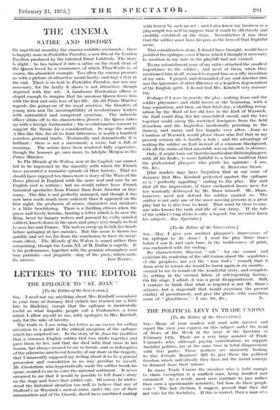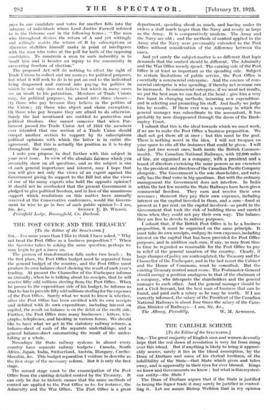'THE POLITICAL LEVY IN TRADE UNIONS [To the Editor of
the SPECTATOR.] Sin,—Many of your readers will read with interest and regret the view you express on this subject under the head of News of the Week • in the issue of the Spectator of February 14th. There are a very large number of Trade Unionists who, although paying contributions to support Socialist politics, are at the same time in total disagreement with this party. These workers are anxiously looking to this Private Members' Bill to give them the political freedom which individually they have not the moral courage to demand from their unions.
In many Trade Unions the member who is bold enough to claim exemption is a marked man, being insulted and ostracized. As a result, most men continue to pay rather - than earn a questionable notoriety, but how do these people vote ? The last election, I suggest, proved that they did - not vote for the Socialists. If this is correct, then a man who
pays to one candidate and votes for another falls into the 2ategory of individuals whom Lord Justice Farwell referred to in the Osborne case in the following terms : " The man who throughout desires the return of A and yet wittingly and willingly assists the return of B by subscriptions or otherwise stultifies himself ranks in point of intelligence with the man who votes at the. poll for both of the opposing candidates. To constrain a man to such imbecility is to insult him and is besides an injury to the community in Preventing freedom of election."
The proposed Act will do nothing to effect the right of Trade Unions to collect and use moneys for political purposes, but what it will seek to do is. to put an end to the individual being dragooned and coerced into paying for politics in which he not only does not believe but which in many cases 'ire an insult to his patriotism. Members of Trade Unions may, for political purposes, be placed into three classes— (1) those who pay because they believe in the politics of the Union ; (2) those who object and claim exemption ; (3) those who pay because they are afraid to do otherwise. Surely the last mentioned are entitled to protection and political freedom. One cannot conceive that when Par- liament passed the Trade Union Act of 1913 the members ever intended that one section of a Trade Union should compel another section to support by its subscriptions political opinions with which the latter is in entire dis- agreement. But this is actually the position as it is to-day throughout the country.
I note you propose to deal further with this subject in your next issue. In view of the absolute fairness which you invariably show on all questions, and as the subject is one of such general importance and interest, may I hope that you will give not only the views of an expert against the Government giving its support to the Bill but also the views of one of the many experts who hold the opposite opinion? It should not be overlooked that the present Government is pledged to give political freedom, and in face of the unanimous support which resolutions on this matter have annually received at the Conservative conferences, would the Govern- ment be wise to go in face of such public opinion ?—I am,











































 Previous page
Previous page